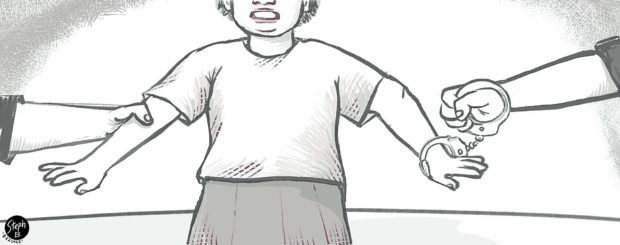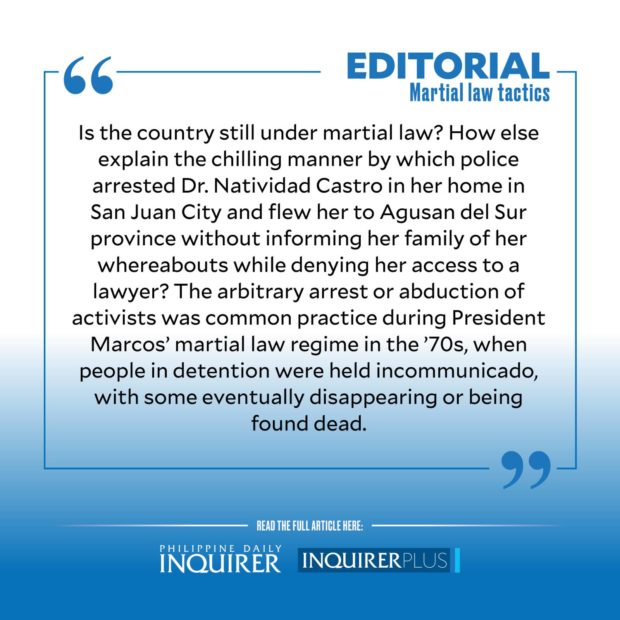Martial law tactics
Is the country still under martial law?
How else explain the chilling manner by which police arrested Dr. Natividad Castro in her home in San Juan City and flew her to Agusan del Sur province without informing her family of her whereabouts while denying her access to a lawyer?
Article continues after this advertisementThe arbitrary arrest or abduction of activists was common practice during President Marcos’ martial law regime in the ’70s, when people in detention were held incommunicado, with some eventually disappearing or being found dead.
According to the Free Legal Assistance Group (FLAG), none of the doctor’s relatives or lawyers were allowed access to her until the day following her arrest on Feb. 18. According to Delfin Castro Jr., about 10 police officers, only two of them in uniform, took his sister Friday morning and ignored questions on where she would be taken.
“Requests for copies of the warrant of arrest, reports and documents relative to Dr. Castro’s arrest and transportation likewise went unheeded,” said FLAG chair Jose Manuel Diokno in a statement.
Article continues after this advertisementOne of Castro’s sisters had gone to the Philippine National Police (PNP) headquarters in Camp Crame to see the arrested doctor and bring her medicines for hypertension and diabetes, but she and a lawyer were denied access. They later learned that Castro had been taken to the airport to be delivered to the court in Butuan City. But family members who went to the airport were unable to see her nor confirm if she was on board a particular flight.
On Saturday, Maj. Dorothy Tumulak, spokesperson for the Caraga Police Regional Office, confirmed that Castro was flown to Davao City and then brought to Bayugan City in Agusan province, where a court had issued the warrant for her arrest.
Castro’s younger sister Menchi finally saw her at the Bayugan City jail late afternoon of Feb. 19, more than 24 hours after she was taken. Castro told her that she had been handcuffed during her flight to Davao City and her trip to the city jail.
You’d think the doctor was a wanted and dangerous terrorist, given the commando-style arrest. Castro’s charges? The alleged kidnapping and illegal detention in 2018 of a member of the CAFGU Civilian Active Auxiliary, the paramilitary group used in anti-insurgency operations. Details of her alleged crime were scant, but in November 2020, Castro was among the human rights advocates in Caraga whose names appeared in a poster distributed in the region identifying them as members of the communist New People’s Army.
But the Commission on Human Rights (CHR), which expressed “grave concern over Castro’s manner of arrest,” pointed out that she had been “Red-tagged for her work as a human rights and development worker.” The group said Castro had initiated health programs in Mindanao before the pandemic and had brought members of the lumad community before the United Nations in Geneva in 2016 to seek help against harassment in their areas. She also served as secretary-general of the human rights group Karapatan, which described the charges against the doctor as trumped up.
By all accounts, “Doc Naty” is a distinguished cum laude graduate of the University of the Philippines’ College of Medicine and a dedicated community doctor, public health practitioner, and human rights activist helping depressed communities in Mindanao, particularly in Agusan provinces, since she started her medical practice in 1996.
St. Scholastica’s College, where Castro graduated valedictorian, denounced her arrest and demanded her immediate release. “What she deserves is recognition and appreciation for her commitment to the welfare and human rights of our Filipino sisters and brothers who are most in need,” the school said in a statement.
The CHR said it is conducting a motu proprio investigation on possible violations of the PNP’s rules of procedure. FLAG also demanded an official probe to determine those responsible for violating Castro’s rights during her arrest.
The overkill in this case speaks of the continuing impunity and contempt for human rights that has marked the policies and actions of this administration. The Red-tagging of militants, rights workers, and government critics, spearheaded by the anti-communist task force NTF-Elcac, only brings division in the country and exacerbates our standing before the international community.
The PNP must heed the widespread call to respect Castro’s rights and hold to account those who had violated them. The Department of Justice must step in and show no tolerance for police abuses in line with its recent pronouncements to the United Nations Human Rights Council.
For once, the Department of Health struck the right chord, when it stated that “All our citizens, health workers included, enjoy the constitutional guarantees of due process and presumption of innocence until proven guilty. We trust our authorities to uphold these rights.’’


















